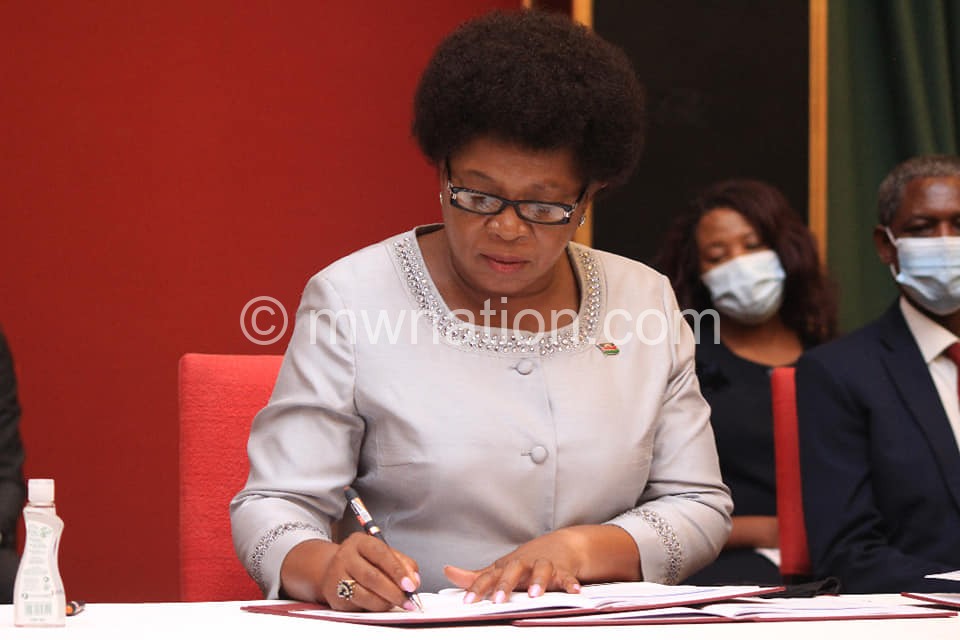Malawi signs water stewardship deal at CoP26
Malawi has signed a new deal to protect water and keep hands off products by businesses that hurt the environment.
Minister of Forestry and Natural Resources Nancy Tembo signed the Glasgow Fair Water Footprint Declaration last Friday on the sidelines of CoP26, the United Nations Climate Change Conference underway in Scotland.

Speaking during the unveiling of the water stewardship agreement, she urged businesses to emulate tea growers under Sukambizi Association Trust in Lujeri, Mulanje who conserve water and use it sustainably amid harsh effects of climate change.
“We need to encourage industries and ourselves that we should not only aim to have water, but also use it in a more sustainable manner and avoid pollution at all cost. If we continue with what is happening now, we will continue to have poor quality water not fit for human use,” Tembo said.
Malawi has signed up to the fair trade pact alongside the United Kingdom, the Netherlands, Switzerland, Finland, Madagascar and Peru.
Reads the declaration in part: “We collectively commit to taking all necessary steps to ensure that the water footprints which we have control over and influence upon, at home and abroad, will be sustainable, resilient and fair by 2030.”
Tembo said the signing of the declaration “positions our country as a competitive player in the global economy” as both government and business captains have not done enough to safeguard water from pollution and deforestation.
She warned against the discharging of household and industrial waste into waterways.
The breakdown in waste management constitutes a rampant environmental and public health crisis personified by urban rivers such as Mudi and Nasolo in Blantyre, Lilongwe and Lingadzi in Lilongwe, Lunyangwa in Mzuzu as well as Likangala in Zomba.
“Water sources are not dumping grounds or sewer systems but essentials to the very life we live,” said Tembo.
The signatories pledged to achieve zero water pollution, strengthen resilience to weather shocks caused by climate change and end water-related conflict within a decade.
The water stewardship also requires governments, consumers and civil society to refuse goods and services produced by businesses that foul water sources through deforestation, pollution and unsustainable extraction.
UK’s Minister of State for Pacific and the Environment said Zac Goldsmith, speaking on the sidelines of CoP26, said: “Fair water footprints mean zero pollution, extracting water sustainably and allocating it equitably, making sure workers have safe water, sanitation and hygiene, planning for droughts, floods and water conflict and harnessing the power of nature.”
He challenged governments and non-State actors to provide due diligence and tracking “for big companies to demonstrate that they do not import goods that benefit from unsustainable water use”.
Goldsmith asked the civil society to hold everyone to account and universities together with researchers to offer evidence of fair water practices across various production chains.
Malesi Shivaji, chairperson of Anew, a pan-African network of civil society groups that safeguard water, said the fair trade and water stewardship declaration offers campaigners a vital tool to provide checks and balances amid a global water stress worsened by unsustainable business practices and climate change.
Shivaji said: “As civil society from Africa, this agreement is very important to us. For far too long, Africa’s trade has been driven by extraction and exploitation of natural resources, which results in exploitation of water, workers and nature as well as widening inequalities caused by unethical practices that we need to keep in check.
“The Fair Water Footprint is a new mechanism for accountability which can bolster sustainability in water conservation and access globally.”
In an interview on the sidelines of the CoP26, Malawi’s Civil Society Network on Climate Change national coordinator Julius Ng’oma commended the government for signing the declaration, but said putting pen to paper is nothing without clear targets and transformative action.
He said: “Signing such commitments is easy, but implementing the pledges isn’t. Our government needs to come up with a clear roadmap, specific targets and progress tracking mechanisms for all key stakeholders to participate in the implementation process.”
By Friday, seven countries and 30 businesses had signed up to the agreement partly spearheaded by Water Witnesses, which promotes water stewardship and fair trade requirements in the tea plantations in Mulanje and Thyolo.





